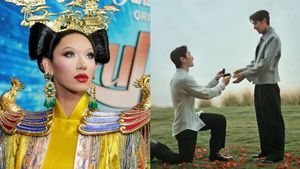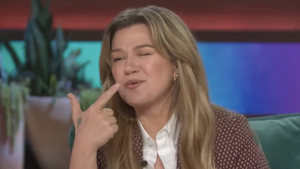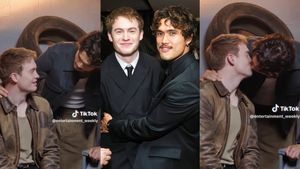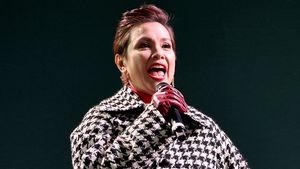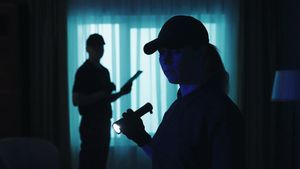
CONTACTAbout UsCAREER OPPORTUNITIESADVERTISE WITH USPRIVACY POLICYPRIVACY PREFERENCESTERMS OF USELEGAL NOTICE
© 2025 Equal Entertainment LLC.
All Rights reserved
All Rights reserved
By continuing to use our site, you agree to our Private Policy and Terms of Use.
Move over, Carrie Prejean. Claire Buffie, crowned Miss New York in June, is the first Miss America contestant to compete on a gay rights platform. A trained dancer and Apple employee, she knows her profile may seem unusual for a pageant contestant, and that's exactly why she believes she can win over America in the competition this January.
In her first interview with the gay press, the 24-year-old Indianapolis native spoke with The Advocate about her platform of improving the climate for LGBT youths in schools, misconceptions about beauty pageant contestants, and the real lesson of Prejean, the 2009 Miss USA runner-up.
Do you think beauty pageant contestants are misunderstood?
Yes, I do. Even upon entering my first local for the Miss America organization four years go, I had some of those stereotypes that are very common -- the hairspray, the eyelashes, the glue and the tape, and all those things. What I found was a group of incredibly intelligent, driven, and service-minded women. I have found my absolute best friends through this organization.
The Miss America organization is a scholarship organization. Each of us has a platform that we support. Girls support platforms from a variety of places. Things like promoting the arts, arts education in schools, traffic safety, driving safety.
Do you fit the stereotypical mold of a pageant contestant?
I don't think I fit the mold at all, but I think that's been the greatest part and the reason I have such an effect on people throughout the pageant. My coworkers have said, "No offense, but I didn't think you were a pageant girl." It's empowering women.
What is your day job?
I have my own business in commercial portraiture and graphic design. I also work for Apple, but I'm not allowed to say any more about Apple other than I work for the company on the technical side, based on PR restrictions.
How did you get started in competition?
I started just four years ago. My platform was a strong reason in getting started. I think it's an unlikely challenge for this message to be discussed. I competed in Indiana for two years in college. Once I graduated, I came to New York and continued competing. I don't think I would have continued competing if my platform was not something about which I'm so passionate.
Are you aware of any predecessors who competed on a gay rights
platform?
In the 90-year history of Miss America, we have not yet
found any Miss America contestant who has had this platform. It is
quite unique.
My platform is "Straight for Equality: Let's Talk." I feel that it's really important to promote equality for all people, "all" being the main word. As a straight ally, I think it's so necessary to have that straight allies' support for the LGBT community. My platform is politically driven in that I think we need political reform for gay rights, but I've really taken it down to organizations like PFLAG where I have the opportunity for personal mentorship.
I would say that during my year as Miss New York, a big focus of mine will be the schools. PFLAG has for the past five years developed a safe schools program but it's been our main focus for the past two years. Last year we spoke to about 1,600 kids around Manhattan and the five boroughs, speaking a lot in areas like the Bronx, where we have an added level of cultural and racial discrimination, especially toward those in the LGBT community. You're breaking all the stereotypes. My opportunity is to go into the schools and speak to someone who is five, six, seven years younger than me. I still feel able to identify with them. They're able to see someone who's young and straight and a role model.
What inspired you to take up these issues?
My sister Sarah is a big part. She is a lesbian. I think that started my outward advocacy. I would say that our family in general was always very accepting of every kind of diversity. And so when Sarah came out, it empowered me to speak up rather than just remain in neutral. In addition, I was a dancer growing up and in a dance program at Ball State University. My community is full of LGBT people. It's my duty to speak up for them. One of the reasons I adopted this platform is that I realize my family is unique. So many kids don't have that experience. I want to make sure my experience becomes more of the norm.
Is the Miss America organization ready for your platform?
Well, I think it should be. Look around. This is a nonprofit organization run completely by volunteers. The people involved in sustaining this program, so many of them are LGBT when you think about it, our fan base. The gay community has stood behind us. When I walk into an event with a crown on, I'm supported. I think they are ready. I think I am prepared to present it to Miss America in a way that they won't be able to say no. I acknowledge that there's a risk involved, because at the end of the day the one person standing is going to represent the entire organization, but at the end of the day, she also represents the entire nation. Ultimately, I have a platform about respect and equality for all.
Have there been any negative responses to your message?
I have not felt a push-back from people. When I get into a conversation, they realize that I am not here to change someone's mind. I am here to open a dialogue. That's why my platform is "Straight for Equality: Let's Talk." People may think of marriage equality, but actually, gay rights is a platform for so many more issues.How does it feel to represent New York after such a rocky year for gay rights in the state?
I feel like here I have the opportunity to effect more of a change than I would in Indiana, and I really want to make the most out of this year. It's not taking the easy road, because New York City may be accepting, but I am representing the entire state, and we definitely have some challenges in some other parts of the state. Marriage equality disappointed people, but two days before I walked through the contest, the Dignity for All Students Act passed the senate and will be signed by the governor. And that was an incredible opportunity for me to discuss this issue.
What was your favorite part of the Miss New York competition?
Interview was my favorite. It always has been. I was the second runner-up for Miss Indiana 2008 and the third runner-up for Miss New York in 2009. It's been something I've been successful in, but I can't deny that I love walking onstage. I've won the swimsuit competition in the past three state contests and interview as well.
Are you aware of any lesbian Miss America contestants?
I haven't heard of anyone who is out, but interestingly enough, someone was asked in her interview last year, do you think someone who was gay could ever win, and her answer was, "How do you know one hasn't won already?" To my knowledge there has not been a lesbian Miss America or Miss America contestant; however, I don't think it would hurt her chances.
What did you think of the controversy surrounding Carrie Prejean at the Miss USA pageant in 2009?
The question is a difficult part of the competition. I initially applauded Carrie for having an opinion and voicing it rather than just feeding the public what they wanted to hear. I feel she was forced into a media frenzy over which she did not have complete control. The difference between Carrie Prejean and myself is that this is a platform on which I have personal stories to share and I can support statistically, and I don't think she had that education on the issue to be a spokesperson. I think if anyone's going to speak publicly about a serious issue like this, they need to be completely [knowledgeable]. I feel sorry for someone in that situation.
Also, a difference is that Miss USA is for-profit. Miss America is nonprofit. Miss America is the largest provider of scholarships for women. Miss USA is paid in cash. Miss USA has a swimsuit and evening gown and short interview. Miss America has more of an emphasis on the platform and talent.
What are your career ambitions?
I have always wanted to be involved in the performing arts but not necessarily as a form. My photography is for actors' and dancers' head shots; my Web design is for marketing. My ultimate career would be to be on the production end of a talent agency where I was helping to propel actors and models. And I definitely have a strong interest in event planning.
Where are the next steps in the Miss America competition for you?
The Miss America pageant will be broadcast live on January 15. They have not announced the pageant location yet for this year. During the live broadcast, the top 15 people compete. So I will have to make it into those top 15 scores in order to compete on live television. In past years the American public has been able to vote in a popular vote that gets anywhere from one to four contestants into that 15. I hope the LGBT community will be behind me.
From our Sponsors
Most Popular
31 Period Films of Lesbians and Bi Women in Love That Will Take You Back
December 09 2024 1:00 PM
18 of the most batsh*t things N.C. Republican governor candidate Mark Robinson has said
October 30 2024 11:06 AM
True
These 15 major companies caved to the far right and stopped DEI programs
January 24 2025 1:11 PM
True
Latest Stories
Parents don’t stop fighting for their LGBTQ+ kids
April 02 2025 5:19 PM
Out gay Colorado Gov. Jared Polis mocks Donald Trump's 'unflattering painting'
April 02 2025 12:36 PM
Here are 11 major companies standing up for DEI
April 02 2025 12:21 PM
Appeals court denies Trump DOJ’s request to halt injunction on trans military ban — for now
April 02 2025 11:00 AM
Your Lovable Trans Auntie asks, "Where do we go from here?"
April 02 2025 7:00 AM































